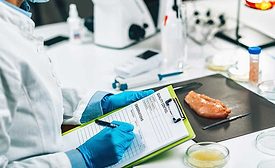Home » Keywords: » food safety testing
Items Tagged with 'food safety testing'
ARTICLES
Food safety professionals continue to be focused on efforts to continually get better at their fundamental responsibility to produce safe food
Read More
How is the Revolution in Technology Changing Food Safety?—Part 2
How has adoption of different technologies affected processors' daily food safety operations and improved their food safety outcomes?
August 8, 2024
How is the Revolution in Technology Changing Food Safety?
How has adoption of different technologies affected processors' daily food safety operations and improved their food safety outcomes?
July 2, 2024
Food Safety Insights
Testing to Continue to Increase in 2021
Environmental monitoring and a focus on continuous improvement in sanitation drive increases in test volumes
April 15, 2021
CANNABIS PRODUCTS | MARCH 2020
Achieving cannabinoid consistency in food and beverage products
From raw ingredients to the end product, maintaining accurate cannabinoid content is crucial for developing safe, compliant cannabis foods and beverages.
May 15, 2020
Real-time data logging system helps iQ Foods maintain food safety
iQ Foods is an expert at monitoring food color, bone color and purge (water, lactic acid and meat pigments.)
April 10, 2019
How digital solutions transform food safety training programs
Today, cloud-based training helps solve some of the key challenges pertaining to food safety training.
April 9, 2019
Study: Growth in dairy testing market driven by stringent food safety regulations
Increase in outbreaks of foodborne illnesses and uptick in stringency of safety and quality regulations continue to drive the growth in demand for dairy testing.
April 9, 2019
AFFI unveils online program for Listeria control in frozen food facilities
This tool discusses food safety best practices that directly address control and prevention of Lm in frozen food manufacturing.
February 27, 2019
Cornell University develops tool for controlling foodborne pathogens in food manufacturing facilities
The study focused on developing and testing a computer model that has the potential to pinpoint locations in a food manufacturing facility where Lm might be found.
February 20, 2019
Never miss the latest news and trends driving the food safety industry
eNewsletter | Website | eMagazine
JOIN TODAY!Copyright ©2025. All Rights Reserved BNP Media.
Design, CMS, Hosting & Web Development :: ePublishing











